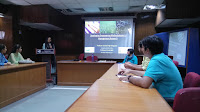I have read most of the book and it has been enlightening. I shared some of the ideas discussed but have never stopped to reflect more on them. I have never been keen on quantitative/positivist research in management, particularly because I think management is about people and their ideas, relationships and emotions. I think in-depth accounts and similar are better show and explain how "real people" are as opposed to numbers. This book has helped me to consider many more reasons.
I find the following quote by Professor Patti Lather (from the book's blurb) very inspiring:
Informed by critical and feminist evaluations of positivism, Tuhiwai Smith urges researching back and disrupting the rules of the research game toward practices that are more respectful, ethical, sympathetic and useful vs racist practices and attitudes, ethnocentric assumptions and exploitative research.
The following is the List of Contents:
1. Imperialism, History, Writing and Theory
2. Research Through Imperial Eyes
3. Colonizing Knowledges
4. Research Adventures on Indigenous Lands
5. Notes from Down Under 95
6. The Indigenous People's Project:
7. Articulating an Indigenous Research Agenda 123
8. Twenty-five Indigenous Projects 142
9. Responding to the Imperatives of an Indigenous
10. Towards Developing Indigenous Methodologies: Kaupapa Maori Research
I recommend this book if you are interested in qualitative research and why still nowadays qualitative researchers are still struggling to get more recognition.
You can download a PDF Version of the book from the Standing Rock website.
You can download a PDF Version of the book from the Standing Rock website.


